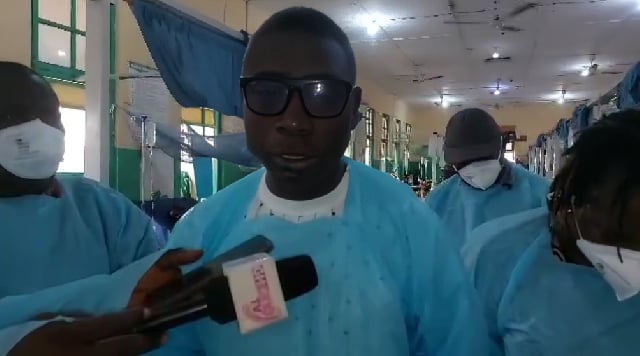The Effutu Municipality in Ghana’s Central Region is grappling with a concerning cholera outbreak, claiming the lives of two children and leaving 10 others in critical condition. A total of 356 suspected cases have been reported, with 29 confirmed infections. The deceased children are currently at the morgue awaiting postmortem examinations. The outbreak, concentrated predominantly in coastal fishing communities, has disproportionately affected children and pregnant women, raising serious concerns about the vulnerability of these populations. The Winneba Municipal Hospital, the primary healthcare facility managing the crisis, currently has 15 patients admitted for cholera treatment, while approximately 100 individuals displaying symptoms are expected to be discharged soon. This suggests a dynamic situation with both ongoing infections and recoveries, highlighting the need for sustained and comprehensive intervention.
The outbreak has prompted alarm and calls for immediate action. James Kofi Annan, the National Democratic Congress (NDC) parliamentary candidate for Effutu, characterized the situation as “alarming,” underscoring the severity of the crisis and the urgent necessity for comprehensive intervention strategies. He observed a clear correlation between sanitation conditions and the spread of the disease, noting that areas with better sanitation infrastructure, including access to running water and toilets, have remained relatively unaffected. Conversely, communities like Sankor, Juma, Ponkoekyir, and Alatapokodo, which struggle with inadequate sanitation systems, are bearing the brunt of the outbreak. This highlights the critical role of sanitation in preventing and controlling the spread of cholera, a waterborne disease that thrives in unsanitary environments.
Annan has pledged to address the sanitation challenges contributing to the outbreak, specifically highlighting the Sankor refuse dump, a known scavenging site for children. His commitment to relocating this dump underscores the understanding that such sites contribute significantly to the spread of cholera. The impending cleanup exercise planned for the affected communities further emphasizes the importance of environmental hygiene in controlling the outbreak. These actions demonstrate a proactive approach to addressing the root causes of the disease transmission, moving beyond immediate treatment and focusing on long-term preventative measures.
Beyond environmental interventions, Annan has committed to utilizing his radio station to disseminate crucial information to the public. By partnering with the municipal health directorate, he aims to amplify awareness campaigns and educate the community about cholera prevention and management. This utilization of local media highlights the potential of community engagement in public health crises, leveraging existing communication channels to reach a wider audience. This multifaceted approach combines infrastructural improvements with educational initiatives to create a more holistic and effective response to the outbreak.
Annan’s contribution of essential supplies, including tissues, hand sanitizers, liquid soap, and nose masks, provides immediate support to those affected and underscores the importance of personal hygiene in preventing further spread. However, he acknowledged the inadequacy of these donations in light of the outbreak’s severity, emphasizing the need for further resources and assistance. His efforts to engage with higher authorities, including the Ghana Health Service director-general and the Minister of Health, demonstrate a concerted effort to mobilize greater support and coordinate a more robust response. This proactive engagement with national health authorities highlights the seriousness of the outbreak and the need for a coordinated national response.
Dr. Douglas Amponsah, the Acting Medical Superintendent of the Winneba Municipal Hospital, emphasized the urgency of implementing emergency measures to stem the outbreak’s spread. This call for swift action underscores the critical nature of early intervention in containing cholera outbreaks. The situation in Effutu mirrors similar outbreaks in other Central Region districts – Ajumako, Agona West, and Ekumfi – highlighting a broader regional challenge that requires a coordinated and comprehensive response. This recurring pattern of cholera outbreaks in the Central Region points towards systemic issues related to sanitation and access to clean water, necessitating long-term solutions beyond immediate outbreak control.
The cholera outbreak in Effutu Municipality illuminates a complex interplay of factors contributing to the spread of infectious diseases. Inadequate sanitation infrastructure, particularly in the affected fishing communities, creates a breeding ground for cholera. Limited access to clean water exacerbates the risk, while socioeconomic factors likely contribute to the vulnerability of certain populations. The response to the outbreak involves a multifaceted approach, encompassing immediate medical treatment, public awareness campaigns, and infrastructural improvements. The urgency of the situation necessitates swift action and coordinated efforts from local authorities, healthcare providers, and community leaders to effectively control the outbreak and prevent further fatalities. The ongoing efforts to secure additional resources and support from national health authorities highlight the importance of a collaborative approach to address the complex challenges posed by this public health crisis. The situation underscores the critical need for long-term investments in sanitation and public health infrastructure to prevent future outbreaks and safeguard the well-being of vulnerable communities.


